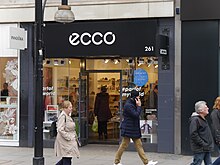ECCO
hideThis article has multiple issues. Please help or discuss these issues on the talk page. (Learn how and when to remove these template messages)
|
| Type | Aktieselskab |
|---|---|
| Founded | 1 April 1963 (as A/S Bredebro Skofabrik) |
| Founder | Karl Toosbuy |
| Headquarters | Bredebro, Denmark |
Key people | Steen Borgholm (CEO) Hanni Toosbuy Kasprzak (Chairman) |
| Products | Shoes, leather, and accessories |
| Revenue | 1,309m Euro (2018)[1] |
Number of employees | 21,300 |
| Website | group.ecco.com |



ECCO Sko A/S is a Danish shoe manufacturer and retailer founded in 1963 by Karl Toosbuy, in Bredebro, Denmark. The company began with only the production of footwear, but has since expanded into leather production, as well as accessories and small leather goods. ECCO opened its first retail store in Denmark in 1982. ECCO’s products are sold in 99 countries from over 2,250 ECCO shops and more than 14,000 sales points. ECCO is family-owned and employs 21,300 people worldwide.
History[]
This section does not cite any sources. (November 2016) |
ECCO was established in 1963 by Karl Toosbuy in the small town of Bredebro in southern Denmark. Throughout the 1980s, the company expanded its operations internationally. By 1982, sales reached 1 million pairs of shoes annually. In order to accommodate the increasing demand, additional production was established in Portugal, and under license in Japan and Cyprus.[2] ECCO built its own research and design center, named "Futura", in Denmark in 1996, since 2009 Portugal is the R&D center of ECCO and opened its own beamhouse in Indonesia and tannery in Thailand a few years later. In 1998 the first flagship retail store opened on Oxford Street, in London. By 2000, ECCO owned every step of the production process, from design and leather production to branded retail sales.
Production[]
ECCO owns tanneries in the Netherlands, Thailand, Indonesia and China. ECCO’s tanneries are among the leading manufacturers of leather to the fashion, sports, and car industries.[3] ECCO has engaged in a research program to reduce the environmental impact of the tanning process. Approximately 98% of ECCO's shoes are produced in its own shoe factories in Portugal, Slovakia, Thailand, Indonesia, Vietnam and China, and some under licence in India.
In 2016 Adidas filed a trademark suit against ECCO in USA Courts.[4] However, in 2018, Adidas voluntarily dismissed its claims.[5]
International[]

ECCO shoes and leather goods are sold in 99 countries. The company has its operations into markets in Asia and in Eastern and Central Europe, Canada, South America, and the United States. Their products are sold through more than 2,250 mono-brand stores, as well as independent retailers and online sales.[6]
Criticism[]
Quality[]
In 1998, ECCO faced problems with a large quantity of shoes. Due to a production fault involving the composition of sole material - hydrolysis of the molded polyurethane - the soles disintegrated after only one to five years.[7] After discovering the source of the problem, ECCO changed the composition of its sole material.[citation needed]
References[]
- ^ "ECCO Annual Report 2018". ECCO Sko A/S.
- ^ Wilson, Rodney (18 June 1992). Cyprus and the International Economy. Palgrave Macmillan UK. p. 10. ISBN 978-1-349-12186-1. Retrieved 22 February 2018.
- ^ "ECCO Annual Report 2006" (PDF). Archived from the original (PDF) on 2011-07-10. Retrieved 2010-08-05.
- ^ "Adidas Files Trademark Suit Against Fellow Footwear Brand, ECCO".
- ^ "From Forever 21 to FC Barcelona, a Look at adidas' History of 3-Stripe Legal Fights". October 16, 2019.
- ^ Mamun, Jasan (5 June 2010). "ECCO schoenen:Altijd het goedkoopste & Altijd gratis verzending". merkschoenenwinkel.nl. Retrieved 4 November 2016.
- ^ "The Case of the Crumbling Shoes". www.phlmetropolis.com.
External links[]
| Wikimedia Commons has media related to Ecco. |
- Shoe brands
- Danish brands
- Shoe companies of Denmark
- Danish companies established in 1963
- Multinational companies headquartered in Denmark
- Purveyors to the Court of Denmark